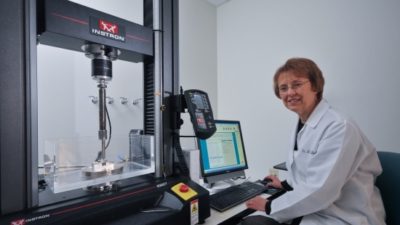U.S. Oncology network adopts university’s recommendations
While radiotherapy saves the lives of many oral cancer patients, they face a lifetime of post-treatment complications, including severe tooth breakdown. University of Missouri-Kansas City research is changing the dental care of cancer patients across the country; more than 43,000 Americans are diagnosed with oral cancer each year.
The U.S. Oncology Network, one of the largest networks of integrated community cancer care practices, adopted UMKC’s research. The network’s most recent radiotherapy treatment planning document, referencing UMKC research, is distributed widely to hundreds of radiation oncology clinicians.
“It’s very gratifying to see UMKC research being used to enhance oral cancer care,” said Mary Walker, associate dean for research and graduate programs at the UMKC School of Dentistry. “The outcomes from studies such as ours reinforce the importance and benefits of research teams that integrate basic and clinical science to address relevant health questions.”
UMKC School of Dentistry researchers, including Walker, who was the principal investigator, Yong Wang, Jeffrey Gorski, Jacob McGuire and Ying Liu, collaborated with Karen Williams, UMKC School of Medicine; An-Lin Cheng, UMKC School of Nursing and Health Studies; and Ganesh Thiagarajan, UMKC School of Computing and Engineering. They worked with Brian Wichman, James Coster and Steven Howard of the U.S. Oncology Network.
The UMKC work was based on a National Institutes of Health-funded clinical study with more than 100 oral cancer patients enrolled. Following the initial study, UMKC received funding for a second NIH grant to understand the mechanism of radiotherapy-induced changes in tooth structure leading to tooth breakdown. The team’s research produced “extremely important discoveries” about the dentin-enamel junction (DEJ) structure and biochemical composition.
Walker said the work not only provides a new biochemical biomarker for the DEJ, but also suggests that type IV collagen and associated proteins play a role in bonding enamel to dentin. Even more significant, the fact that type IV collagen is reduced after radiotherapy for oral cancer patients supports this finding, since irradiated teeth are prone to enamel delamination.
“Beyond the impact of our work on oral cancer care, our findings also provide dental researchers with a missing piece to the puzzle of how the DEJ functions,” Walker said. “That can be applied to the discovery of effective techniques to prevent and repair damaged or decaying teeth.”

